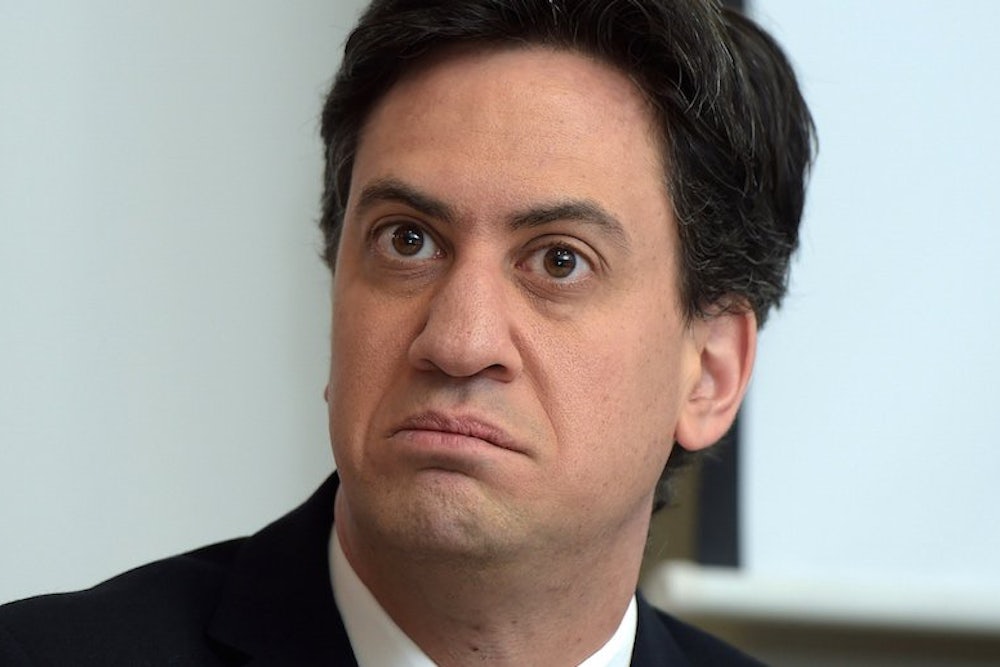There are many big issues at stake in Britain’s general election on Thursday. Will Britain leave the European Union? Will it eliminate its fleet of nuclear submarines? Will the NHS, Britain’s prized healthcare system, face further budget cuts? But one question looms above them all:
Is Ed Miliband too weird to win?
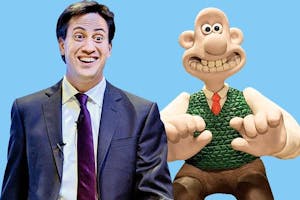
It’s not hard to poke fun at the geeky, awkward 45-year-old leader of the Labour Party, who hopes to become Britain’s next prime minister. Sure, Miliband is smart and has appealing policy positions—he wants to fund the NHS by raising taxes on tobacco and mansions, for instance. But to many Britons, he just doesn’t look or sound like a leader. He has a nasal voice and an expressive, but unphotogenic face. At times, he bears an uncanny resemblance to Wallace (as opposed to Gromit). At other times, he looks grumpy, maniacal, or profoundly sad.
Miliband is not unaware of his image problem. “You can find people who are more square-jawed, more chiseled. Look less like Wallace," he told the press last year. "If you want the politician from central casting, it’s just not me. It’s the other guy.”
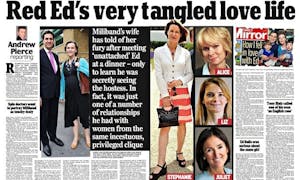
Fleet Street's conservative press wants the other guy: current Prime Minister David Cameron, the leader of the Conservative Party since 2005. To that end, newspapers like The Daily Mail and The Sun have made "Miliband is a weirdo" a daily story—plastering unflattering photos of him on their front pages, referring to him as “Red Ed” (to imply he's a socialist), and inventing a "tangled" love life (he met his current wife, Justine, at a dinner party hosted by his then-girlfriend, but didn't start dating Justine until a year later).
But Miliband is not without his supporters, who have defended him with at least as much passion as the conservative press has mocked him. There's a vicious (but also hilarious) war over Miliband's image—and it may determine who wins the election itself.
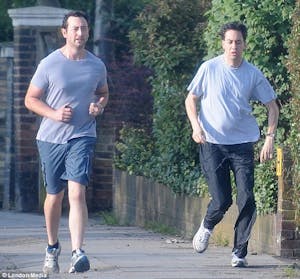
The war over Miliband’s image is being fought most fiercely on social media. Political advertising on television and radio is banned in Britain, and each party is allocated a set number of broadcasts through the BBC based on their level of support. Strict campaign finance rules prevent candidates from spending the astronomical sums regularly seen in American politics. When the U.K. Independence Party received a £1 million donation last month, it didn’t really know what to do with the money. But these strict election regulations have not reached the Internet, which has emerged as the central battleground for the campaigns.

And the Internet, as we know, lends itself to all kinds of hijinks and absurdities. An unflattering photo of Miliband jogging, and one in which he's eating a bacon sandwich, have gone viral. The latter became a meme, with Miliband—his eyes mid-blink, his mouth-chew—being Photoshopped into images from "Seinfeld," "The Sopranos," "Sex and the City," and The Last Supper.
Then, two weeks ago, #Milifandom took the Internet by storm. Started by a 17-year-old student who says she wanted to help people see Miliband as he really is, the hashtag inspired thousands, many of them teenage girls, to tweet about their love for Miliband.
ed miliband flower crown editspic.twitter.com/leGcMXjURg
—
wwonderbox
@twcuddleston Abby my #milifandom #nailart @Ed_Miliband @UKLabour #GE2015 pic.twitter.com/J0O57a6v9c
—
susannasews
And just hours before the election, #JeSuisEd began trending on Twitter, as thousands of people posted photos of themselves awkwardly eating in solidarity with Miliband.
The social-media adoration has, in turn, inspired real-life adoration: Miliband made yet more headlines when a "hen party"—a bachelorette party—mobbed him for selfies.
Which is to say, Miliband has become sort of cool, precisely because he's not.
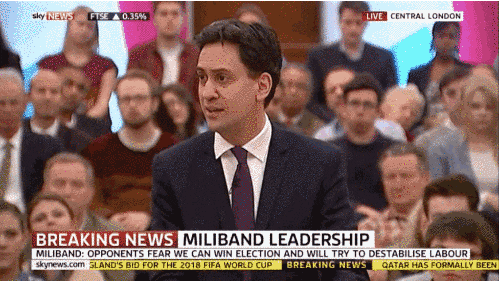
Miliband’s campaign isn't relying solely on Milifans to deliver a victory, of course, and has also gone the more conventional route: counter-messaging. To make the candidate seem more masculine than wonky, it hired Paul Greengrass to direct Ed Miliband: A Portrait—that is, the man who helmed several Bourne movies, United 93, and Captain Phillips. Miliband doesn’t exactly transform into an action star, but somehow the four-minute spot doesn't seem ridiculous, either.
All of this might seem silly, but there’s no escaping the fact that Miliband’s approval rating has improved dramatically in the last four months. According to YouGov, his approval has gone from -52 in January to -18 in mid-April. Obviously, British voters still aren’t crazy about him, but that brings him much closer than expected to David Cameron’s approval rating, which hovers around 0. (And because the British vote for a ruling party rather than for an individual, Miliband’s individual numbers matter less than they would in the American system.)
It’s unclear how much Miliband’s online popularity will impact the election, but with Labour and Conservatives tied at 35 percent the night before, every little thing could count. Even this:
